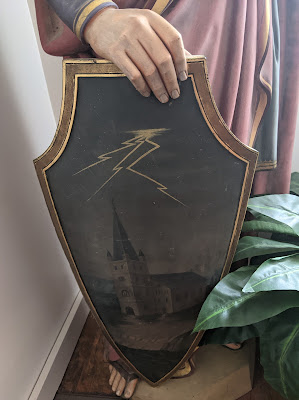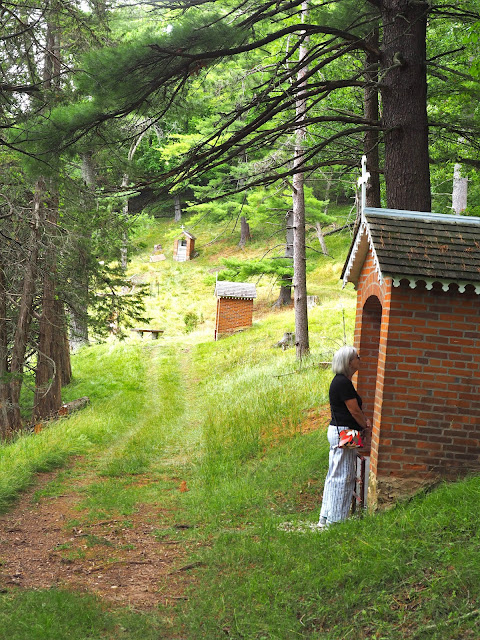When the two remaining pilgrims began the return trip from St. Louis, what they faced was yet another arduous journey, this time back north and west, similar dangers all around. Years passed. Back in the Bitterroots, time staggered along among the Flatheads, who waited anxiously for their very own teacher of this stunning new medicine. They grew restless--no news, they thought, was bad news.In 1835, Old Ignace himself began to think the tribe's emissaries had, somewhere along the way, succumbed to warring bands or wild animals or some unforeseen threats on a trip for which they were vastly less prepared than Lewis and Clark had been thirty years earlier. With every passing month, Old Ignace had become ever more celebrated, like a warm-hearted old Sunday school teacher. A hybrid, Native Christianity spread over the region, so much so that when white colonizers began showing up, they were simply non-plussed when the Nez Perce refused to hunt on the Sabbath--no missionaries could be found anywhere.
Old Ignace wasn't a solo voice. Other Iroquois believers practiced the old-time religion, as did a growing chorus of others they converted to the certain rituals of 17th century European Catholicism. When the warriors the Flatheads had sent to St. Louis didn't return, Old Ignace grabbed two of his own sons to go to St. Louis with him. The people wanted so badly to have their own Black Robe tell them of this new medicine. Old Ignace grew up in French-speaking Quebec; he knew the language of those St. Louis priests.
When he and his sons arrived, their reception must have once again had the priests totally dumbfounded. Immediately, Old Iroquois insisted his sons be baptized. They were. In his best French, once again Old Iroquois demanded the church give them a Black Robe to take back to Montana, where a people were starved for the gospel.
The Jesuits were poor and ragged and struggling. There's was simply no way any of them could raise up a mission out at a place none of them had ever seen, weeks and weeks away. Once again, the emissaries, returning empty-handed, knew the people would feel rejected, defeated.
In 1837, the old Iroquois trapper simply could no longer live with himself, so once again he and, this time, a Nez Perce chief and three Flathead warriors embarked on that same long path to St. Louis, this time in the company of white men, trappers and traders. This time, however, the entire party was attacked by Brule Sioux when they reached a place named Ash Hollow, a place that would, in less than a decade, become a traffic stop for thousands on the Oregon Trail. The Brule Sioux attacked the company, and Old Ignace was killed, along with all his companions. The third expedition had failed.
Even with their leader's passing, the thirst of the Flathead people for Black Robe medicine didn't die or even diminish, and soon--in another year--a fourth delegation departed the valley, just as determined, prayerfully, to return with a priest.
Stop for a moment and imagine the passions stirred up in a Native tribe or two in the Bitterroot Valley of Montana, passions created by an old French-speaking Iroquois trapper from way out east, a man who'd never forgotten the Bible songs of his boyhood, songs about Jesus. By the 1840s, white missionaries, Protestant and Catholic, were moving west by the score. You can be sure not one of them could have dreamed of a mission field so readied for the gospel that the people (they might well have called them "savages") begged for blessings long before anyone in the church had even whispered the gospel they somehow already understood.
And so it was that at just this time, a 38-year old Flemish Jesuit named DeSmet, Pierre-Jean DeSmet, had taken a mission outpost among the Potawatomi, who'd been pushed west from the Great Lakes, stuck on a reservation in eastern Kansas, and weren't happy. That unhappiness they made clear to Father DeSmet. Neither the Potawatomi nor the Jesuit were prospering.
 |
| Father Pierre-Jean DeSmet |
The fourth collection of Bitterroot Valley emissaries, six years after the first, found a man named Fr. DeSmet among the Potawatomi, put on a great sell, and were told that this young priest, taken by their determination, would accompany them to St. Louis and plead their case. One of the party was so taken with the news that he started out immediately for home and walked, through the winter, all of the 1600 miles to spread the great news.That's how it was that when DeSmet and company eventually reached to Grand Tetons, they it was they were met by more than a thousand Native people from several different tribes of the region, all of whom had camped there, awaiting the arrival of their very own priest. Soon there were 2000 who accompanied the new priest through the mountains to the valley and, day by day, listened to his instruction in the gospel. The biggest Bible school on the continent was taking place in a space that had barely been seen by white people.
Although it was off to a glorious start, DeSmet's ministry in the Bitterroot Valley wasn't the dream it must have seemed to him when thousands of Native people met him. Trials awaited them not that far down the road.
But Consider Old Ignace, whose blessed Catholic childhood formed a firm commitment to a gospel he knew only slightly, a man with several wives and many children, who only rarely went to mass, and was almost totally uneducated in the world of the church. Dare anyone doubt his salvation?
The gospel's immense elasticity always seems a wonder, a miracle, even a dream. That elasticity has a life of its own, spread far and wide by no other agent than the Holy Spirit him (or her) self. It never really stops, although, in our humanness, we appear to take joy in erecting stops and building fortresses we believe make our lives in His world more firm, secure, and under control.
By most any theological standard, Old Ignace peddled a grotesque gospel, a medicine, his people would call it, composed of an odd arrangement of ingredients--a heavy dose of medieval Catholic ecclesiastical practice, more than a pinch of Native emotion, and a cup or more of what must have been his own brand of sanctified stubbornness. Whatever it was, his particular faith and its startling effects couldn't be replicated and has, by this day and age, even in the Bitterroots, likely entirely disappeared.
But his story is worth the glorious light it sheds on all of our lives. Just the same, his endless enthusiasm and persistence make me wonder whether, today, I'd like to have him in my church. He wasn't taken by boundaries.
What the scriptures make clear is the Almighty doesn't care. He takes his own where and when He will. We draw lines to say no. We have a long history of taking in keeping undesirables away from what is so precious it could be offered only to us.
Consider Old Ignace. Consider him a saint. God does.




























